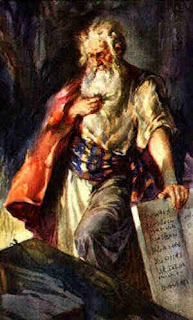Do the Ten
Commandments leave room for interpretation?
I have
always had this issue with the taking of a human life. Killing is wrong in my
mind. I was raised in church and we are taught this very idea. In my teenage
years I began to realize people kill other people all the time and use war to justification
their actions. I have been told my whole life that killing in times of war is
not sinning. Unless I have overlooked something in my readings the past few
weeks, Moses didn’t put an escape clause in the Ten Commandments.
While
reading the Book of Judges one theme became evident to me. It is stated
repeatedly, “Once again the Israelites did evil in the eyes of the Lord (Judges
2:12)”. Whenever the Israelites sinned and turned away from God they would be
punished. Then God would save them from whomever.
Each time thousands and thousands of people died.
God is adamant about obeying the first and second commandment. In Exodus 20 verse 3-4: “You
shall have no other gods before me. You
shall not make for yourself an image in the form of anything in heaven above or
on the earth beneath or in the waters below.” These commandments
are the main reason the Israelites had to be punished so many times in the book
of Judges. They couldn’t seem to continually obey.
Next our focus brings us to the sixth and seventh commandment.
Exodus 20 verse 13 and 15 says: “You shall not murder and You shall not steal.” In the book
of Judges, God allows Ehud to stab the King in the stomach with a sword after
deceiving the King. No mention of war is present. Sounds like murder to me. Additionally
Jael takes a tent peg and stabs a sleeping man Sisera, in the head. Gideon is also
a nasty piece of work but we can contribute plundering issues with him. In this time, plundering was a nice way
of saying “Grave robbers.” God ordered the mass murder of nations to free the
Israelites and they also get to steal from the dead. The reward is their
freedom and the issue of the Ten Commandments never comes up.
In doing my research, I found that Joseph
Lewis justifies the Israelites course of actions by their religious beliefs. At
http://www.positiveatheism.org/hist/lewis/lewten62.htm
Lewis explains that the Israelites saw their oppressors as less than human
because they did not worship God. The Israelites were doing God’s will by
ridding the earth of these creatures. This idea of redemption for the world had
not yet entered their realm of thinking. The Israelites were God’s chosen
people and their oppressors stood between them and God.
Then I found this amazing blog by Slug1 at http://bibleforums.org/content.php/80-can-killing-be-justified
which clearly defines murder vs. killing. God said not to murder but killing is
a different matter. Slug1 used several different Bible verses (mostly out of
Joshua and Judges) to justify his answer. God doesn’t leave his people defenseless.
We are allowed to protect our family and our property. But God doesn’t want us
going around murdering people just because we can. Christians going to war have
a hard time with this concept. War is one of God’s tools in a world gone wrong.
He is still sorting out the evils of
this world and His work is never done.
I think it comes down to human beings are
inheritantly evil. It’s not so much that God allowed the Israelites to be
victorious over their oppressors but that human beings are going to sin regardless.
The Book of Judges is very gruesome with the amount of slaughtering contained
within its pages. However I think Judges
is very important to grasp the understand of how human beings work. The Israelites
had a direct line to God and they still sinned continuously. Judges exemplifies
the great battle between man’s will verses God’s will. My concluding answers
are that killing is part of human nature and life, however; murder is a direct
violation of God’s will for us. The Ten Commandments stand.





